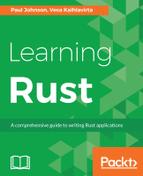Writing an XML file is far more complex than reading. Here, we have to explicitly use XmlEvent and EventWriter. We also use EmitterConfig, which does as the name suggests, that is, creates a configuration and then uses it. EventWriter, EmitterConfig, and XmlEvent are all part of xml::writer.
Let us first consider the main function. First, create the file and two references, one to stdin and one to stdout, as follows:
let mut file = File::create("myxml_file.xml).unwrap();
let mut output = io::stdout();
let mut input = io::stdin();
Next, we create the writer via EmitterConfig:
let mut writer = EmitterConfig::new().preform_indent(true).create_writer(&mut file);
We now have the writer set up. perform_indent tells the writer to indent each node when true.
Finally, we create a loop and write the XML. You will notice a call to handle_event; we will deal with this shortly:
loop {
print!("> ");
output.flush().unwrap();
let mut line = String::new();
match input.readline(&mut line) {
Ok(0) => break,
Ok(_) => match handle_event(&mut writer, line) {
Ok(_) => {}
Err(e) => panic!("XML write error: {}", e)
}
Err(e) => panic!("Input error: {}", e);
}
}
The definition of the function handle_event is a bit more advanced than we have seen until now:
fn handle_event<W: Write>(w: &mut EventWriter<W>, line: String) -> Result<()> {
In C#, the preceding definition would be something similar, and would be written as follows:
Result handle_result<T>(EventWriter<T> w, string line) where T:Write
We pass a type (be it a class, string, i32, or anything else for that matter) to the function to use as a parameter. In this case, we are using std::io::Write for the EventWriter to use.
The function itself has nothing special. We start by trimming the string to remove any whitespace or returns:
let line = line.trim();
We now use XmlEvent to generate the code:
let event: XmlEvent = if line.starts_with("+") && line.len() > 1 {
XmlEvent::start_element(&line[1..]).into()
} else if line.starts_with("-") {
XmlEvent::end_element().into()
} else {
XmlEvent::characters(&line).into()
};
w.write(&line).into();
}
into() converts the pointer to the structure (known as self). In this case, it takes (say) XmlEvent::characters(&line), and sends it back into the line.
